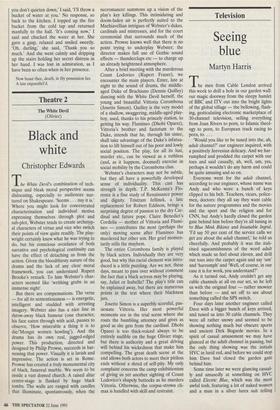Theatre 2
The White Devil (Olivier)
Black and white
Christopher Edwards
The White Devil's combination of tech- nique and bleak moral perspective seems dislocating, especially to audiences nur- tured on Shakespeare. 'Seems . . . nay it is.' Where you might look for concentrated characterisation and individual motive expressing themselves through plot and sub-plot, Webster tends to create archetyp- al characters of virtue and vice who switch their points of view quite readily. The play- wright certainly knew what he was trying to do, but his conscious avoidance of both narrative and psychological continuity can have the effect of detaching us from the action. Given the bloodthirsty nature of the drama and the lack of any clear moral framework, you can understand Rupert Brooke's remark. To him Webster's char- acters seemed like 'writhing grubs in an immense night'.
But there are compensations. The verse — for all its sententiousness — is energetic, intelligent and studded with arresting imagery. Webster also has a nice line in throw-away black humour (one character, his face eaten through with acid, pauses to observe, 'How miserable a thing it is to die/'Mongst women howling'). And the drama has its own real, jagged-edged power. This production, directed and designed by Philip Prowse, succeeds in har- nessing that power. Visually it is lavish and impressive. The action is set in Rome. Prowse has created a truly monumental city of black, funereal marble. We seem to be inside a vast domed church. A raised altar centre-stage is flanked by huge black tombs. The walls are ranged with candles that illuminate, spontaneously, when the necromancer summons up a vision of the play's key killings. This intimidating and doom-laden air is perfectly suited to the Machiavellian intrigues of Webster's dukes, cardinals and mistresses, and for the court ceremonial that surrounds much of the action. Prowse knows well that there is no point trying to underplay Webster; the director makes full use of Gothic sound effects — thunderclaps etc — to charge up an already heightened atmosphere.
After a brief meeting with the murderous Count Lodovico (Rupert Frazer), we encounter the main players. Enter, late at night to the sound of drums, the middle- aged Duke of Brachiano (Dennis Quilley) dancing with the White Devil herself, the young and beautiful Vittoria Corombona (Josette Simon). Quilley is the very model of a shallow, swaggering, middle-aged play- boy, used, thanks to his princely station, to getting his way. Flamineo (Dhobi Oparei), Vittoria's brother and factotum to the Duke, intends that he, through his sister, shall take advantage of the Duke's infatua- tion to lift himself out of his poor and lowly social position. The play, for all its lust, murder etc., can be viewed as a ruthless (and, as it happens, doomed) exercise in social mobility by the Corombona clan.
Webster's characters may not be subtle, but they all have a powerfully developed sense of individuality. This cast has strength in depth. T.P. McKenna's Flo- rence is a fine study of Renaissance power and dignity. Tristram Jellinek, a late replacement for Robert Eddison, brings a surprising degree of passion to the dry Car- dinal and future pope. Claire Benedict's Cordelia — mother of Vittoria and Flami- neo — contributes the most (perhaps the only) moving scene after Flamineo has murdered her other son. Her grief momen- tarily stills the mayhem.
The entire Corombona family is played by black actors. Individually they are very good, but why this racial element was intro- duced is a little puzzling. Are we not, these days, meant to pass over without comment the fact that a black actress may be playing, say, Juliet or Isabella? The play's title can be explained away, but there are numerous points in the text where their blackness jars.
Josette Simon is a superbly scornful, pas- sionate Vittoria. Her most powerful moments are in the trial scene where she routs the bumbling attorney and gives as good as she gets from the cardinal. Dhobi Oparei is too thick-voiced always to be entirely audible on the huge Olivier stage, but there is authority and a great driving will behind his wickedness that make him compelling. The great death scene at the end allows both actors to meet their pitiless ends without a shred of self-pity. My only complaint concerns the camp exhibitionism of giving us yet another sighting of Count Lodovico's shapely buttocks as he murders Vittoria. Otherwise, the corpse-strewn cli- max is handled with skill and restraint.


























































 Previous page
Previous page